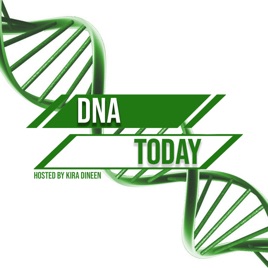
Advertise on podcast: DNA Today: A Genetics Podcast
Rating
4.8 from
Country
This podcast has
277 episodes
Language
Publisher
Explicit
No
Date created
2017/02/23
Average duration
37 min.
Release period
8 days
Description
Discover New Advances in the world of genetics, from technology like CRISPR to rare diseases to new research. For over a decade, multi-award winning podcast ”DNA Today” has brought you the voices of leaders in genetics. Host Kira Dineen brings her genetics expertise to interview geneticists, genetic counselors, patient advocates, biotech leaders, researchers, and more. ***Best 2020, 2021, and 2022 Science and Medicine Podcast Award Winner*** Learn more (and stream all 250+ episodes) at DNAtoday.com. You can contact the show at info@DNAtoday.com.
Social media
Check DNA Today: A Genetics Podcast social media presence
Podcast episodes
Check latest episodes from DNA Today: A Genetics Podcast podcast
#277 Trisomy 18 with Parent Sarita Edwards
2024/02/23
To continue our rare disease month celebrations (leading up to rare disease day on Feb 29th, the rarest day in the year), in this episode we chat with Sarita Edwards who’s son Elijah has Trisomy 18.
Sarita Edwards (she/her) is the CEO & President at the E.WE Foundation, a global healthcare advocacy organization for families living with Trisomy 18 (Edwards Syndrome) and other rare diseases. Sarita's son Elijah was diagnosed in utero with Full Trisomy 18 which began her efforts of advocacy and public policy. Sarita is a 2021 world's top patient expert and social health ambassador. She is an award winning advocate, global speaker, and host of the Being Rare Podcast. Sarita is a legislative advocate providing insight on policy initiatives within her home state and across the country. Sarita has a Bachelor of Science in Health Science, a Masters in Healthcare Administration, and is a certified Mental Health Instructor. Sarita lives in North Alabama with her husband Kareem and their five children.
Exploring Trisomy 18:
- Sarita shares her personal journey and experiences upon learning that her son, Elijah, may have Trisomy 18, offering insights into her pregnancy and interactions with healthcare providers.
Challenging Misconceptions:
- Dispelling common misconceptions about Trisomy 18, Sarita sheds light on the realities and complexities of living with this condition.
Supporting Families:
- We delve into the challenges families face when caring for a child with Trisomy 18, exploring the vital role of organizations like the E.WE Foundation in providing support and resources.
Empowering Advocacy:
- Sarita discusses her introduction to the Trisomy 18 community, the inspiration behind founding the E.WE Foundation, and its evolution in supporting families worldwide.
Mission of the E.WE Foundation:
- Gain insights into the mission and goals of the E.WE Foundation, its commitment to supporting families living with Trisomy 18 and rare diseases, and the importance of raising awareness.
Advice and Guidance:
- Sarita offers heartfelt advice to parents navigating a diagnosis of Trisomy 18, drawing from her own experiences and journey with her son, Elijah.
Collaboration and Impact:
- Learn how the E.WE Foundation collaborates with healthcare professionals and organizations to enhance care and resources for individuals with Trisomy 18.
Future Hopes and Aspirations:
- Sarita shares her hopes for the future, envisioning advancements in awareness, research, and care for individuals with Trisomy 18.
We recommend listening to Episode #228 of DNA Today, highlighting the importance of continued education and awareness around Trisomy 18 and other rare diseases.Be sure to check out E.WE Foundation’s website for more info and resources. Keep your eye out for Kira’s guest appearance on Sarita Edwards’ podcast, Being Rare.
The next episode of DNA Today will be an exciting announcement about a collaboration for a brand new podcast in the genetics research space, stay tuned for March 1st…
New episodes are released every Friday. In the meantime, you can binge over 275 other episodes on Apple Podcasts, Spotify, streaming on the website, or any other podcast player by searching, “DNA Today”. Episodes since 2021 are also recorded with video which you can watch on our YouTube channel, this includes some episodes recorded at NBC Universal Stamford Studios.
DNA Today is hosted and produced by Kira Dineen. Our social media lead is Corinne Merlino. Our video lead is Amanda Andreoli. Our Outreach Intern is Sanya Tinaikar. Our Social Media Intern is Kajal Patel. And our logo Graphic Designer Ashlyn Enokian.
See what else we are up to on Instagram, X (Twitter), Threads, LinkedIn, Facebook, YouTube and our website, DNAToday.com. Questions/inquiries can be sent to info@DNAtoday.com.
more
#276 Targeted DNA Methylation Sequencing with Wasatch BioLabs
2024/02/16
In this episode, we're diving deep into the realm of targeted DNA methylation sequencing, a cutting-edge technology with vast implications for clinical diagnostics and research. Joining us are Chad Pollard, CEO and Co-Founder of Wasatch BioLabs, and Dr. Jonathon Hill, an expert in genomic and bioinformatic methods. Together, they shed light on the importance of DNA methylation, the intricacies of targeted sequencing, and the future of epigenetic analysis.
Chad Pollard, BS
CEO | Co-Founder
Chad, a PhD candidate of Cell Biology and Physiology at BYU, graduated with his bachelor's degree in Genetics, Genomics, and Biotechnology and is currently furthering his pioneering work on pre-symptomatic diagnostics for neurodegenerative disease. He focuses on implementing groundbreaking technology through Wasatch BioLabs to impact clinical care.
Dr. Jonathon Hill, PhD
VP of Science and Technology | Board Member | Co-Founder
Jonathon, an Associate Professor of Cell Biology and Physiology at BYU, develops innovative genomic and bioinformatic methods for gene expression analysis and variant detection. He studies the molecular genetics of congenital heart defects in his lab. He is a Fulbright Scholar and a BYU Early-Career Teaching Award recipient, having received his MS in Molecular Biology from the University of Colorado Health Science Center and a PhD in Genetics and Developmental Biology from Columbia University.
Understanding DNA Methylation Sequencing:
- An overview of DNA methylation and its significance in regulating gene expression and cellular function.
- Insights into how targeted DNA methylation sequencing works and the conditions that prompt its use in clinical and research settings.
- Chad discusses Wasatch BioLabs' motivation for incorporating targeted methylation assays into its sequencing services and how this capability addresses unmet needs in various settings.
Advantages of Oxford Nanopore Technologies' PromethION Platform:
- An exploration of the advantages of using the PromethION platform for targeted methylation analysis, including accuracy, coverage, sensitivity, scalability, and cost-effectiveness.
- Dr. Hill delves into the development process behind targeted sequencing technology for methylation analysis and considerations for panel design to ensure relevance and specificity.
- Measures taken by Wasatch BioLabs to ensure the accuracy and reliability of methylation data obtained through its targeted sequencing service, including quality control protocols.
- Challenges encountered in implementing targeted methylation assays on the PromethION platform and how Wasatch BioLabs has addressed these challenges.
Clinical Applications and Future Implications:
- Potential clinical applications of targeted methylation analysis for early diagnostics and personalized medicine, along with insights into disease mechanisms and therapeutic strategies.
- Walkthrough of the sample submission process and receiving results for the Targeted DNA Methylation Sequencing service, along with customization options available to researchers.
- Ongoing collaborations and partnerships involving Wasatch BioLabs to explore the utility of targeted methylation assays for various diseases and conditions.
- Chad and Dr. Hill share their excitement about the future of targeted methylation analysis and its potential contributions to advancements in research and healthcare.
Learn more on Wasatch BioLab’s website.
Stay tuned for the next new episode of DNA Today next Friday! New episodes are released every Friday. In the meantime, you can binge over 275 other episodes on Apple Podcasts, Spotify, streaming on the website, or any other podcast player by searching, “DNA Today”. Episodes since 2021 are also recorded with video which you can watch on our YouTube channel, this includes some episodes recorded at NBC Universal Stamford Studios.
DNA Today is hosted and produced by Kira Dineen. Our social media lead is Corinne Merli
more
#275 ALS Genetics with Dr. Patrick Short
2024/02/09
In this episode we're delving into the intricate landscape of ALS (Amyotrophic Lateral Sclerosis), commonly known as Lou Gehrig's disease. Returning to the show is Dr. Patrick Short, CEO and Co-Founder of the healthtech platform Sano Genetics. With his expertise in researching large-scale genome sequencing and rare disorders, Dr. Short provides invaluable insights into the genetics of ALS.
Dr. Patrick Short is a Cambridge-trained PhD geneticist with experience researching large-scale genome sequencing and rare disorders. He is CEO and co-founder of healthtech platform Sano Genetics, which is accelerating the world’s transition to precision medicine. Sano simplifies studies, working with pharmaceutical companies and biotechs to find, screen, and engage participants faster and more cost effectively; with researchers to increase efficiency and impact; and with patient advocacy groups to drive research with and for their communities.
Understanding the Role of Genetics in ALS
- Dr. Short sheds light on the role genetics plays in ALS and discusses potential non-genetic factors that contribute to the disease.
Genetic Factors and Risk for ALS
- Exploration of genes associated with a higher risk for ALS and whether they contribute to diagnosis or merely increase susceptibility.
Evolution of Understanding in ALS Genetics
- Dr. Short discusses how our understanding of ALS genetics has evolved in recent years and offers insights into future advancements.
Comparing ALS with Other Neurodegenerative Disorders
- Insights into how the genetic landscape of ALS differs from conditions like Alzheimer's and Parkinson's disease.
The "Light The Way" Program by Sano Genetics
- An introduction to Sano Genetics' free program, "Light The Way," designed for families affected by ALS.
- Eligibility criteria and the enrollment process for families interested in participating in the "Light The Way" program.
- Key objectives and expected outcomes of the "Light The Way" program, focusing on uncovering genetic risks for ALS.
Challenges in Large-Scale Genetic Studies
- Dr. Short discusses the complexities and challenges involved in conducting large-scale genetic studies focused on ALS.
Contributions to ALS Research and Therapy Development
- Envisioning how data collected can contribute to our understanding of ALS and the development of potential therapies.
Importance of International Collaboration
- Insights into the crucial role of international collaboration and data sharing in advancing genetic research and therapy development for ALS.
As we navigate the intricate genetics of ALS, Dr. Patrick Short provides a wealth of knowledge and perspective, offering hope for advancements in diagnosis, treatment, and ultimately, a cure for this devastating disease. Join us in this enlightening conversation as we strive to unravel the mysteries of ALS and pave the way for a brighter future.
If you enjoyed hearing from Dr. Short, listen to Episode #106 of DNA Today where he shared about the genetics of autism. Dr. Short also hosts Sano Genetics’ show, The Genetics Podcast; you can hear our host Kira Dineen on Episode #15. She will also be a panelist on Sano Genetics’ upcoming webinar exploring newborn screening, stay tuned! A few years ago, Kira was the writer of a Sano Genetics blog series, “Explained By A Genetic Counselor”.
If you want to hear from a patient perspective we highly recommend Episode #16 of It Happened To Me with Brooke Eby. It’s the most popular episode of the podcast by far (nearly 10,000 views on YouTube)! Kira Dineen is also the Executive Producer of the show.
Stay tuned for the next new episode of DNA Today next Friday! New episodes are released every Friday. In the meantime, you can binge over 275 other episodes on Apple Podcasts, Spotify, streaming on the website, or any other podcast player by searching, “DNA Today”. Episodes since 2021 are also recorded with video which you can watch on
more
#274 Wolfram Syndrome with Stephanie Snow Gebel
2024/02/02
Happy Rare Disease Month! Did you know why February was chosen? It's because it harbors the rarest day of the year, February 29th, which coincides with Rare Disease Day. To kick off this special month, we're thrilled to share a poignant episode of the "It Happened To Me Podcast," where rare diseases take center stage.
Our host, Kira Dineen, is the Executive Producer of the "It Happened To Me" podcast and had the privilege of co-hosting this episode, delving into the complexities of Wolfram Syndrome. Our guest is a parent of a child with Wolfram Syndrome, while one of the hosts of the show (Cathy) also grapples with this condition. This unique dynamic led to a deeply insightful conversation, filled with personal experiences and valuable insights. We hope you'll enjoy and learn from this discussion as much as we did.
Wolfram Syndrome is a rare recessive genetic condition with profound implications. Our guest on this episode is Stephanie Snow Gebel, a parent and advocate who has dedicated herself to raising awareness and advancing research through the Snow Foundation for Wolfram Syndrome. Stephanie shares her journey as a parent of a child diagnosed with Wolfram Syndrome, offering insights into diagnosis, management, advocacy, and hope.
Understanding Wolfram Syndrome:
Stephanie describes Wolfram Syndrome, outlining its complex array of symptoms, including diabetes, optic nerve atrophy, vision loss, deafness, loss of taste and smell, and urinary and bladder dysfunction.
The Wolfram Journey:
Stephanie recounts her journey as a parent of a child with Wolfram Syndrome, from the initial noticing of symptoms to diagnosis and beyond.
Diagnosis and Symptoms:
Stephanie shares about her daughter’s symptoms and experiences with Wolfram Syndrome, shedding light on the challenges faced.
The Role of the Snow Foundation:
Stephanie discusses the creation and mission of the Snow Foundation, highlighting its impact in filling a void and driving research efforts forward.
Treatment and Management:
Insights into managing Wolfram Syndrome, including treatment of individual symptoms such as diabetes and vision loss.
Current Trials and Hope for the Future:
Stephanie provides updates on current trials, discussing the goals and implications for patients with Wolfram Syndrome.
Exploring the potential of trials to slow progression or offer hope for a cure.
Advocacy and Awareness:
The role of advocacy and organizations like The Organization for Rare Disorders in raising awareness and supporting patients with Wolfram Syndrome.
Life with Wolfram:
An update on Stephanie’s daughter’s current status, prognosis, and how she is managing with Wolfram Syndrome.
Closing Thoughts and Advice:
Stephanie shares her insights and advice for listeners, emphasizing the importance of advocacy, awareness, and hope in the face of rare diseases like Wolfram Syndrome.
As we conclude this insightful conversation with Stephanie Snow Gebel, we are reminded of the resilience, courage, and hope that shine through in the face of challenges posed by Wolfram Syndrome. Join us in raising awareness, supporting research, and fostering hope for a brighter future for individuals and families affected by this rare condition.
The Snow Foundation is a collective voice for Wolfram syndrome patients, working towards a cure for Wolfram syndrome and developing novel therapies for diabetes, vision loss, hearing loss and neurodegeneration.
Please be sure to check out more episodes of It Happened To Me, just search the title in whatever podcast player you use to listen to DNA Today!
Stay tuned for the next new episode of DNA Today next Friday! New episodes are released every Friday. In the meantime, you can binge over 270 other episodes on Apple Podcasts, Spotify, streaming on the website, or any other podcast player by searching, “DNA Today”. Episodes since 2021 are also recorded with video which you can watch on our YouTube channel, this incl
more
#273 ENPP1 Deficiency Disorders with Inozyme
2024/01/26
As we delve into the intricacies of ENPP1 Deficiency Disorders, Dr. Yves Sabbagh and Christine O’Brien provide invaluable insights into genetics, diagnostics, treatment, and collaborative efforts between the patient community and pharmaceutical companies. Join us in this illuminating conversation, as we navigate the complexities of GACI and explore avenues for a brighter future in managing these conditions.
Yves Sabbagh, PhD, is senior vice president and chief scientific officer, joining Inozyme in October 2020. Dr. Sabbagh brings to Inozyme more than 20 years of experience in rare genetic disorders and mineral metabolism with responsibilities leading to the identification and evaluation of novel therapeutic approaches and translating them into clinical candidates.
Prior to joining Inozyme, Dr. Sabbagh served as the head of Rare Renal and Musculoskeletal Diseases research at Sanofi. Prior to that executive role, he held scientific roles of increasing responsibility at Sanofi and Genzyme Corporation spanning endocrine, renal and rare bone diseases including driving the strategy for bone indications. Prior to his corporate experience, he was an instructor at the Harvard Medical School in the Endocrine unit. Dr. Sabbagh has co-authored more than 40 peer-reviewed publications and book chapters and is a member of several scientific societies. Dr. Sabbagh received a BSc in biochemistry from McGill University, an MSc in microbiology from Université Laval and a PhD in biology from McGill University.
Christine O’Brien lives outside of Boston, Massachusetts with her husband Michael and their 3 children. Her two oldest children are both living with ENPP1 Deficiency. Her husband and son also have Loeys-Dietz Syndrome. She is a founding member and co-president of GACI Global, the only patient advocacy group that exists for patients with GACI / ARHR2 caused by ENPP1 Deficiency or ABCC6 Deficiency. Prior to joining the ranks of medical mamas everywhere who manage therapies, appointments, and medications, she was an elementary school guidance counselor. Today, in addition to her work with GACI Global, Christine currently juggles raising children with part time jobs as a photographer and the director of customer service at British Swim School of Greater Boston.
Episode Discussion Outline
Exploring the Genetic Causes:
- Dr. Sabbagh explains the genetic causes of GACI, shedding light on the involvement of genes such as ABCC6 and ENPP1.
- Does the gene involved determine the type of GACI?
Diagnostic Challenges and Genetic Testing:
- The necessity of genetic testing for diagnosis and potential programs to offset the cost to patients.
- Christine discusses the challenges patients face in obtaining an accurate diagnosis and the impact of the diagnostic odyssey on families.
Symptoms and Challenges Across Lifespan:
- Understanding the symptoms of ENPP1 Deficiency Disorders throughout the lifespan and the challenges they pose in disease comprehension.
- What signs should healthcare providers be aware of across different specialties?
Understanding PPi and Its Role:
- Dr. Sabbagh elaborates on the role of PPi in the body, highlighting differences in individuals with GACI and its implications.
Current Treatment Options and Unmet Needs:
- Insights from Dr. Sabbagh on existing treatment options and unmet medical needs in ENPP1 Deficiency disorders.
Partnerships and Collaboration:
- Christine provides insights into the partnership approach between patient communities and Inozyme Pharmaceuticals.
- How does Inozyme collaborate with the patient community to address challenges?
Hope for the Future:
- Dr. Sabbagh discusses INZ-701 and its potential in addressing the challenges associated with GACI.
- An overview of the clinical trial program underway for ENPP1 Deficiency treatment.
Future Hopes and Advancements:
- Christine shares her hopes for advancements in GACI research, diagnosis, and treatment, emphasizin
more
#272 Clinical Trials for One Patient with Dr. Joe Gleeson
2024/01/19
This episode was originally released on the Patient Empowerment Program podcast, where our host Kira Dineen serves as a Producer. Sometimes you might even hear Kira’s voice in promos and ads.
In this podcast, Dr. Stan Crooke and Dr. Gleeson discuss the importance of genomics for neurology and how genetic information is changing how the medical community approaches neurological diseases.
Dr. Joseph Gleeson is n-Lorem’s Chief Medical Officer and holds a Rady Children’s Hospital Auxiliary Endowed Professorship of Neuroscience. He is an Investigator with the Simons Foundation for Autism Research Initiative, and an Elected Member of the National Academy of Medicine.
Diagnosing a rare disease can be incredibly difficult. Over the past 10 years, advances in genomic sequencing coupled with an explosion of research on the functional consequences of mutations in genes are reshaping how the medical community thinks about rare diseases. Being able to evaluate a patient’s entire genetic makeup often allows physicians to identify mutations in genes that are causal for disease. These mutations can be common, meaning that they are found in many patients with a particular disease. These mutations can be incredibly rare (often one patient in the world; n-Lorem refers to them as nano-rare). For a patient that has a gene mutation that is rare, they often have no therapeutic options.
How many patients have mutations that have never been identified? Dr. Gleeson estimates that 90% of all gene mutations that have been identified in recent years have never been identified before.
Access to genome sequencing is becoming more and more available and as such, the rare-research community is finding it easier to diagnose patients properly with information from databases, leading to an influx of newly discovered gene mutations and n-of-1 individuals. Gleeson and his team at UCSD have identified that out of the over 2 million known human mutations, there is a viable path for ASO or gene therapy treatment for half of them.
On This Episode We Discuss:
The impact of genomic sequencing in medicine
The difference between a genotype and phenotype
How often a patient is identified with a genetic mutation unique to them
Focusing on the underlying cause of disease and not just treating symptoms
A viable path for treatment for how many gene mutations?
Why he chose to become n-Lorem’s Chief Medical Officer
Dr. Joe Gleeson studied chemistry as an undergraduate at UC San Diego. While in college, he frequently volunteered at a hospital and decided that practicing medicine would be a great way to apply his understanding of chemistry. Particularly, he wanted to figure out how the brain works while focusing on brain disease. Dr. Gleeson continued his education by attending the Pritzker Medical School at the University of Chicago, and then completed his residency and fellowship at Harvard. While in medical school, his eyes were opened to child neurology – understanding how the brain forms and how humans mature.
Immediately upon practicing pediatrics, Dr. Gleeson noticed that most patients suffering from rare diseases didn’t have or would never receive a diagnosis. It was obvious to him that to change the lives of these patients, researchers must learn more about the diseases to allow physicians to not just treat the symptoms, but to combat the gene to reduce the severity of the phenotypes.
Diagnosing a rare disease can be incredibly difficult. Genomics has made a massive difference in the medical field over the past 10 years by allowing doctors to see a patient’s entire genetic makeup. Finding a patient who is the only person in the world affected by a specific disease, or an n-of-1 patient, is surprisingly common. Gleeson estimates that 90% of all mutations identified are unique. As technology advances, the rare-research community is finding it easier to diagnose patients properly with information from databases, leading
more
#271 Genetic Optic Neuropathies with Dr. Andrew Carey
2024/01/12
This episode was originally released on It Happened To Me: A Rare Disease podcast, where our host Kira Dineen is the Executive Producer. Sometimes you might even hear Kira join as a guest host especially when there will be genetic topics.
It Happened To Me is a rare disease and medical challenges podcast. The mission of the show is to create community as listeners confront the toughest challenges in life. All of us will experience health hardships. The real question is, how do we adapt? That’s the focus of It Happened To Me. The podcast explores how to overcome limitations and live a full and satisfying life. Drawing on their own health challenges, hosts Cathy Gildenhorn and Beth Glassman interview guests who share stories and research to help others succeed in the face of difficult health obstacles.
In this episode, we were honored to have Dr. Andrew Carey as a guest. As a disclosure, Dr. Carey is the co-host Cathy Gildenhorn’s doctor who diagnosed her rare disease, Wolfram Syndrome. Andrew R. Carey, MD (he/him) is an Assistant Professor of Ophthalmology in the division of Neuro-Ophthalmology at the Wilmer Eye Institute. He specializes in neuro-ophthalmic disorders such as optic neuritis, uveitis related papillitis, ischemic & hereditary optic neuropathies as well as diseases of the retina, including age-related macular degeneration, diabetic retinopathy, toxic retinopathies and inherited disorders of the retina such as retinitis pigmentosa.
As we unravel the complexities of neuro-ophthalmic disorders and rare diseases, Dr. Andrew Carey provides a wealth of knowledge and guidance. Join us in this enlightening conversation, gaining insights into the diagnostic journey, the detective work of a neuro-ophthalmologist, and the promising future of research in this field.
Defining Neuro-Ophthalmology:
- An exploration of what neuro-ophthalmology entails and indications of when individuals should seek the expertise of a neuro-ophthalmologist.
Eyes as Windows to Rare Diseases:
- Discussion on the potential for diagnosing rare diseases through eye examinations.
- Identifying the type of eye doctor suitable for evaluating and diagnosing rare diseases.
Diagnostic Journey and Recognizing Symptoms:
- Dr. Carey shares insights into a typical diagnostic journey, illustrated by Cathy's experience with Wolfram syndrome.
- The significance of recognizing atypical symptoms and the role it played in Cathy's diagnosis.
Referral Process and Timely Treatment:
- Understanding the referral process to a neuro-ophthalmologist.
- Strategies to help patients find treatment in a timely manner.
Dr. Carey as a Medical Detective:
- Dr. Carey's role as a detective in diagnosing various health conditions through eye examinations.
- An exploration of different types of optic neuropathies and their distinctions.
Communication with Eye Doctors:
- Emphasizing the importance of open, detailed, and comprehensive communication about symptoms with eye doctors.
Wolfram Syndrome and Rare Diseases:
- Dr. Carey's journey of learning about Wolfram syndrome, whether in school or through practical experience.
- Insights into diagnosing rare diseases and their genetic components.
Demographics of Rare Disease Patients:
- Understanding the age demographics of patients with rare diseases – pediatric, adult, or both.
Wolfram Research and Future Outlook:
- Dr. Carey shares details about his research on Wolfram syndrome and its goals.
- How listeners can get involved, learn more, or contribute to support research efforts.
The Future of Rare Diseases and Genetic Optic Neuropathies:
- Dr. Carey provides a glimpse into the future of rare diseases and genetic optic neuropathies.
Closing Advice:
- Dr. Carey shares valuable advice for listeners as they navigate potential neuro-ophthalmic concerns or rare diseases.
Please be sure to check out more episodes of It Happened To Me, just search the title in whatever podcast player you us
more
#270 Embryo and Miscarriage Genetic Testing with Kelly Loggenberg
2024/01/05
In this episode we dive deep into two crucial reproductive genetic topics with the knowledgeable and experienced genetic counselor, Kelly Loggenberg. Joining us from Next Biosciences, a Female-led South African Biotechnology company specializing in Reproductive Genetic Testing, Kelly sheds light on Preimplantation Genetic Testing for Aneuploidy (PGT-A) and Genetic Testing of Miscarriage, also known as Products of Conception (POC).
Overview of PGT-A:
- Kelly provides an overview of Preimplantation Genetic Testing for Aneuploidy (PGT-A) and its role in reproductive genetic testing.
- Reasons why patients or couples opt for PGT-A and the decision-making information it provides.
NIPS vs. PGT-A:
- The distinctions between Non-Invasive Prenatal Screening (NIPS) and PGT-A, exploring conditions that NIPS can screen for that PGT-A may not cover.
- The necessity of NIPS when a couple has opted for PGT-A for their embryos.
Challenges and Ethical Considerations:
- Discussion on the challenges and ethical considerations associated with PGT-A.
- How genetic counselors navigate these discussions with patients.
Products of Conception (POC) Testing:
- Insight into Products of Conception (POC) testing and the situations prompting individuals or couples to choose this genetic testing.
- Contribution of POC testing to understanding miscarriages and its role in future reproductive planning.
Practical Aspects of POC Testing:
- Clarification on whether individuals can bring in tissue for POC testing after a miscarriage at home or if a follow-up procedure is required.
Regional Variations and International Experience:
- Kelly's international experience in the UK and the potential variations in acceptance or utilization of PGT-A and POC testing in different regions/countries.
Technological Advancements:
- How technology and advancements in genetic testing have influenced the landscape of reproductive genetic testing during Kelly's career.
The Future of Reproductive Genetic Testing:
- Kelly's insights into the future of reproductive genetic testing and potential breakthroughs or improvements on the horizon.
- Exciting emerging technologies or research areas within reproductive genetics.
About Kelly Loggenberg:
Kelly holds an MSc (Med) in Genetic Counselling from the University of Cape Town, South Africa, with over 15 years of experience in clinical and research settings. After a decade as a genetic counselor in the UK, she returned to South Africa in 2018. Currently, Kelly serves as the in-house genetic counselor at Next Biosciences, offering valuable advice on preimplantation genetic testing, non-invasive prenatal testing, and products of conception testing to clinicians and patients alike.
As we explore the complexities and advancements in reproductive genetic testing, Kelly Loggenberg provides invaluable insights into the present and future of this rapidly evolving field. Tune in to the podcast to gain a deeper understanding of these essential topics and their impact on reproductive health.
Be sure to check out Episode 221 of DNA Today that Kelly recommended during the episode. In this episode we interview a couple of her fellow South African Genetic Counseling colleagues, Samantha Bayley and Tina-Marié Wessels.
Stay tuned for the next new episode of DNA Today on January 12th! New episodes are released every Friday. In the meantime, you can binge over 270 other episodes on Apple Podcasts, Spotify, streaming on the website, or any other podcast player by searching, “DNA Today”. Episodes since 2021 are also recorded with video which you can watch on our YouTube channel, this includes some episodes recorded at NBC Universal Stamford Studios.
DNA Today is hosted and produced by Kira Dineen. Our social media lead is Corinne Merlino. Our video lead is Amanda Andreoli. Our Outreach Intern is Sanya Tinaikar. Our Social Media Intern is Kajal Patel. And our logo Graphic Designer Ashlyn Enokian.
See what else
more
#269 Computer Vision Diagnosing Genetic Disorders with Robert Boscacci
2023/12/29
Can computers diagnose genetic conditions? Could we train computers to analyze photos of people to help geneticists and other healthcare providers diagnose conditions based on physical features?
Join the visionary journey as our host Kira Dineen sits across from the insightful Robert Boscacci, the mind behind "The Spring of Sight," and unravels the intertwining of computer vision and genetic diagnosis. Plunge into a dialogue that traverses Rob's transition from the digital effects of television to the cutting-edge of AI, illuminating the intricate process of equipping computers to decode our visual world and its transformative impact on medical science. Our discussion explores the precise identification of genetic disorders, offering a glimpse into a future where technology and genetics coalesce with astonishing clarity.
The episode ascends further as we scrutinize the nuanced realm of data and bias in teaching machines to see. We dissect the transition from traditional rule-based algorithms to the nuanced world of data-driven AI learning, recognizing the significance of diverse datasets in averting biases—a fundamental aspect when addressing diagnoses across a spectrum of conditions, like the distinctive features of Treacher Collins syndrome. Our conversation turns to the challenges healthcare faces in adopting AI, from stringent validations to the delicate dance of applying AI without overshadowing human expertise. Dive with us into the profound implications of AI in healthcare, where the fusion of human and machine intelligence could redefine the horizons of disease diagnosis and treatment.
In The Spring of Sight, Robert Boscacci draws from his double background in digital film production and machine learning to explore the utility of computer vision with industry experts. In the burgeoning field of computer vision, researchers and entrepreneurs build systems to extract meaning from digital images in unprecedented new ways, and even generate convincing new synthetic images. As advancements in the field carry in a tidal wave of promising use cases, it becomes increasingly clear that we'll have to implement nuanced policies to contend with their double-edged nature.
Robert Boscacci is the former Data Science Lead at Butter Works, a startup that used computer vision to analyze hundreds of thousands of social media videos for clients like Disney+, Netflix, Spotify, and ViacomCBS. He comes from a background in New York City’s film post-production industry, with IMdB credits as a film colorist and dailies technician on Netflix features and episodic productions.
Boscacci is curious about how tech policy can become more proactive, so that communities and organizations can maximize the utility and minimize the harm of the cutting edge. He hopes to encourage readers from all walks of life to join the conversation around tech and policy—so that the folks who normally get steamrolled in the name of progress are more empowered to make their voices heard, and those driving the steamrollers become more aware of themselves.
Boscacci is the caricature of a millennial Brooklyn hipster: Picture him wearing his nearly non-prescription glasses, dismounting his fixie, and tapping to pay to slurp a single-origin espresso on his way to the nonprofit repertory cinema. He un-ironically holds a fishing license from the state of New York and uses it to catch Bluegill in the lake at Prospect Park.
Episode Segments
0:00:43 - Computer Vision for Diagnosing Genetic Conditions
0:04:25 - Exploring the Concept of Computer Vision
0:09:55 - Diagnosing Genetic Conditions With Computer Vision
0:12:07 - Transfer Learning for Vision Models
0:20:40 - Computer Vision in Diagnosing Rare Diseases
0:26:51 - The Importance of Embracing Medical Technologies
Be sure to enter our giveaway to win a signed copy of Rob’s book, “The Spring of Sight” via our X (Twitter), Instagram, Threads, and LinkedIn. Look for the post of me and
more
#268 Optical Genome Mapping and Transcriptome Analysis with Peter Nagy
2023/12/22
We are diving deep into genetic technology, specifically optical genome mapping and transcriptome analysis. Joining us to explore these technologies is Dr. Peter Nagy.
Dr. Nagy graduated from Pécs Medical University, Hungary, in 1989. He received his PhD in biochemistry in 1995 from Purdue University. He completed his AP/Molecular genetic pathology residency and postdoctoral fellowship training at Stanford University Medical Center. Dr. Nagy is a member of ASCP and CAP and serves as a CAP laboratory inspector. He is board certified in Anatomic and Molecular Genetic Pathology and has worked as molecular laboratory director since 2004 at the University of Iowa, Columbia University and Medical Neurogenetics Laboratories. Dr. Nagy’s research interest is the development and application of next generation sequencing and other genomic technologies for molecular diagnostics. He has authored more than 30 articles published in such journals as Cell, Molecular Cell, and Proceedings of the National Academy of Sciences.
On This Episode We Discuss:
Challenges associated with diagnosing rare genetic diseases
How various tiers of genetic testing (panels, exome, whole genome) cater to different clinical needs
Advantage of optical genome mapping compared to traditional cytogenetic analyses like FISH, chromosomal microarray (CMA), and whole exome sequencing (WES)
Power and accuracy of combining whole genome sequencing and optical genome mapping
Advantages of transcriptome analysis
Navigating discussions with healthcare providers and patients to ensure they understand the implications and benefits of various genetic testing technologies
Impact of optimal genome mapping and transcriptome analysis on precision medicine
Learn more about Praxis Genomics on their website. Dr. Nagy has done research on the phylogenetic origins of the Árpád Dynasty, check out this paper in which he is the first author and this paper. In this interview we also referenced DNA Today Episode 247 about DMD Exon Skipping.
Stay tuned for the last 2023 episode of DNA Today on Friday, December 21st! This is a special interview as I sat down with author Robert Boscacci in NBC Universal Studios to pick his brain about how computer vision can be used as a tool to diagnose genetic conditions.
New episodes are released every Friday. In the meantime, you can binge over 265 other episodes on Apple Podcasts, Spotify, streaming on the website, or any other podcast player by searching, “DNA Today”. Episodes since 2021 are also recorded with video which you can watch on our YouTube channel, this includes some episodes recorded at NBC Universal Stamford Studios.
DNA Today is hosted and produced by Kira Dineen. Our social media lead is Corinne Merlino. Our video lead is Amanda Andreoli. Our Outreach Intern is Sanya Tinaikar. Our Social Media Intern is Kajal Patel. And our logo Graphic Designer Ashlyn Enokian.
See what else we are up to on Twitter, Instagram, Facebook, YouTube and our website, DNAToday.com. Questions/inquiries can be sent to info@DNAtoday.com.
more
#267 Is Genetic Ancestry Useful for Carrier Screening?
2023/12/15
We are thrilled to welcome guest Blair Stevens, a certified genetic counselor and Director of Prenatal Genetic Counseling Services at McGovern Medical School at UTHealth Houston and Prenatal Genetics media expert for the National Society of Genetic Counselors. Blair joins this discussion to shed light on the clinical utility of ancestry and its use in reproductive genetic counseling spaces.
Joining as a co-host today is Dessiah Phillips, a genetic counseling student at Sarah Lawrence College. Together, we will explore ancestry data from both a clinical and educational perspective. Tune in as we delve into how this data is used in personalized medicine and tailoring healthcare solutions.
Blair Stevens is a prenatal genetic counselor with over 15 years experience in direct patient care. She is an Associate Professor and serves as the Director of Prenatal Genetic Counseling Services at McGovern Medical School at UTHealth Houston. Blair specializes in helping families understand and adjust to unexpected prenatal diagnoses and counseling families with fetal anomalies identified on ultrasound. She has also served in various leadership positions within the National Society of Genetic Counselors.
On This Episode We Discuss:
Historical and current use of genetic ancestry in healthcare
Approaches and techniques of using ancestry data
Challenges of using ancestry data
How unknown ancestry impacts healthcare
Assessing carrier status of conditions based on ancestry data
Ethical considerations and the future for ancestry data
Stay tuned for the next new episode of DNA Today on Friday, December 22nd! New episodes are released every Friday. In the meantime, you can binge over 260 other episodes on Apple Podcasts, Spotify, streaming on the website, or any other podcast player by searching, “DNA Today”. Episodes since 2021 are also recorded with video which you can watch on our YouTube channel, this includes some episodes recorded at NBC Universal Stamford Studios.
DNA Today is hosted and produced by Kira Dineen. Our social media lead is Corinne Merlino. Our video lead is Amanda Andreoli. Our Outreach Intern is Sanya Tinaikar. Our Social Media Intern is Kajal Patel. And our logo Graphic Designer Ashlyn Enokian.
See what else we are up to on Twitter, Instagram, Facebook, YouTube and our website, DNAToday.com. Questions/inquiries can be sent to info@DNAtoday.com.
more
#266 Genetics Wrapped 2023
2023/12/08
To celebrate the year coming to an end, we are reflecting back on the top genetics and genomics news stories during 2023. It’s hard to fit a year’s worth of genetics in one episode, let alone a half hour so we bring you this special double episode of DNA Today.
Our host Kira Dineen is joined by two leaders in genetics, Dr. Eric Green and Dr. Brendan Lee.
Dr. Eric Green
Dr. Eric Green is the director of the National Human Genome Research Institute (NHGRI) at the U.S. National Institutes of Health (NIH). As NHGRI director, Dr. Green leads the Institute's research programs and other initiatives. He has played an instrumental leadership role in developing many high-profile efforts relevant to genomics. Dr. Green received his B.S. degree in bacteriology from the University of Wisconsin - Madison in 1981, and his M.D. and Ph.D. degrees from Washington University in 1987. Coincidentally, 1987 was the same year that the word “genomics” was coined. Dr. Green’s relationship with the Institute began long before his appointment as director. He served as the Institute’s scientific director (2002 - 2009), chief of the NHGRI Genome Technology Branch (1996 - 2009) and founding director of the NIH Intramural Sequencing Center (1997 - 2009). Prior to that, he played an integral role in the Human Genome Project. Dr. Green is a founding editor of the journal Genome Research (1995 - present) and a series editor of Genome Analysis: A Laboratory Manual (1994 - 1998), both published by Cold Spring Harbor Laboratory Press. He is also co-editor of Annual Review of Genomics and Human Genetics (since 2005). Throughout his career, he has authored and co-authored over 385 scientific publications.
Dr. Green is a recurring guest on DNA Today, and he might hold the title as the guest who has been on the show the most times! He was featured on Episode #182 when we chatted about the Human Genome Project and the recent completion of the human genome sequence -- from telomere to telomere. Dr. Green was a panelist on the PhenoTips Speaker Series installment that our host Kira Dineen moderated about population genomics in clinical practice, this was also released on the DNA Today podcast feed as Episode #260. He was also on last year’s Genetic Wrapped episode (#214).
Dr. Brendan Lee
As a pediatrician and geneticist, the overall mission of Dr. Brendan Lee’s research program is to translate the study of structural birth defects and inborn errors of metabolism into a basic understanding of development, disease and novel therapeutic approaches. In the area of metabolism, we have applied genetic approaches to the study of biochemical genetic disorders (specifically urea cycle disorders) as models of complex diseases (those involving nitric oxide dysregulation). This has led us to study the consequences of metabolic derangements broadly in the endocrine, cardiovascular, skeletal, renal and neurological systems. In the area of structural birth defects, we have studied paracrine and endocrine signaling pathways that regulate skeletal development including morphogens (TGF, Wnt and Notch), and extracellular matrix proteins and their modifications (e.g., collagen prolyl-hydroxylation) that contribute to the human skeletal dysplasias including brittle bone diseases and connective tissue diseases like Ehlers-Danlos syndrome. These developmental pathways have led us to ask how their dysregulation contributes to common diseases such as osteoporosis, osteoarthritis and bone cancer.
The mechanistic discoveries of my laboratory research program are translated into the clinical arena via clinical research that is performed as part of the Skeletal Dysplasia Clinic and the Metabolic Disorders Clinic at Texas Children’s Hospital, respectively, and as part of two NIH rare diseases clinical research consortia (the Brittle Bone Disorders Consortium and the Urea Cycle Disorders Consortium). My clinical research program began with stable isotopic mea
more
Podcast reviews
Read DNA Today: A Genetics Podcast podcast reviews
Asher2018!
2023/07/06
Easy to listen & learn
Easy to listen! Learned so much from so many experts in genetics.
Yogamama1120
2023/04/24
Amazing host and guests!
Kira is a wonderful host! You can tell she is really engaged in the conversation and bringing out the best in her guests. She takes a topic like genet...
more
Jiajie L
2022/12/20
Great place for prospective students to learn genetic counseling
This podcast connected me with genetic counseling, great place to get updates on genetics!
Daddys_little_girl59
2022/10/02
Love this podcast!
I’ve listened to every episode and learned so much! This was how I was introduced to PGx. My favorite episode was about Alzheimer’s and plasmalogens. ...
more
Sheltie1pitbull2
2022/10/04
Yuck
I can barely make it through one episode. There are tons of advertisements for peta, which has supported anti-research and anti-science terrorism. Pet...
more
Nikisweetheart
2022/09/29
Prospective Genetic Counseling Student
I have been listening to this podcast for almost a year now and I have to say the theme song is what caught my attention upon first listening to the s...
more
jorausch6466
2022/09/28
Great Show
I love each episode’s dive into different genetic conditions and the care that the host puts into interviewing her guests.
RoseKemmerling
2022/09/26
Amazing Podcast
As an aspiring genetic counselor, Kira makes it easy to stay up to date on the ever changing genetics world! I highly recommended this podcast and fol...
more
hannahjoy527
2022/06/02
Great Podcast
I was super excited to find a podcast that goes so in depth on genetics. Also, as a genetics major and aspiring genetic counselor, this show helps me ...
more
-----julieee-----
2022/05/11
So informative!!
I absolutely love DNA Today. As an aspiring Genetic Counselor, I find this podcast to be a great way to stay on top of what’s happening in the field w...
more
Podcast sponsorship advertising
Start advertising on DNA Today: A Genetics Podcast & sponsor relevant audience podcasts
You may also like these life sciences Podcasts

4.6
511
605
Psychedelics Today
Psychedelics Today
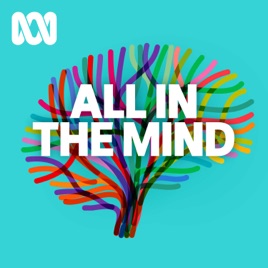
4.5
605
343
All In The Mind
ABC listen
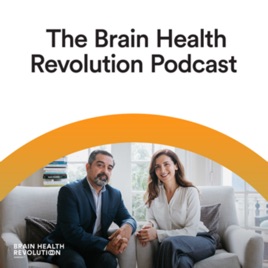
4.9
548
81
The Brain Health Revolution Podcast
Sherzai M.D.
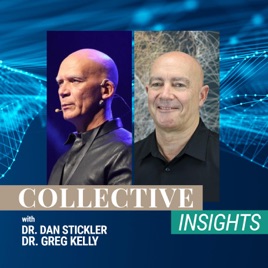
4.8
492
210
Collective Insights
Neurohacker Collective
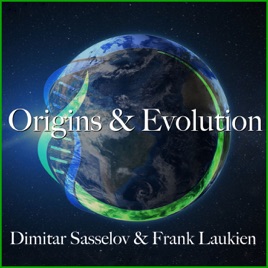
4.8
21
9
Origins & Evolution
Origins
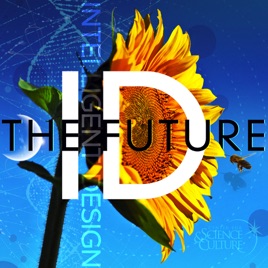
4.4
876
50
Intelligent Design the Future
Discovery Institute
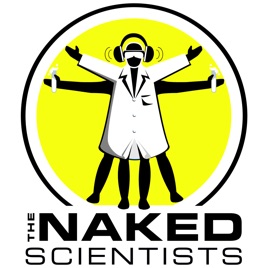
4.6
534
1025
The Naked Scientists Podcast
The Naked Scientists
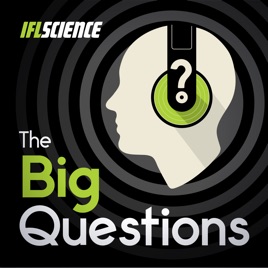
3.8
16
28
IFLScience - The Big Questions
IFLScience
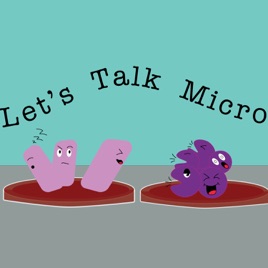
5
23
132
Let's Talk Micro
Luis Plaza

4.7
584
260
WHOOP Podcast
WHOOP




